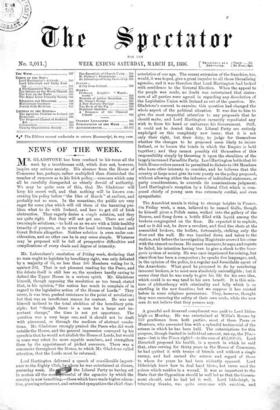Lord Hartington delivered a speech of considerable import-
ance to the Eighty Club b om he was entertained at dinner,
yesterday week. He the Liberal Party as having set in motion all the mo erful of the agencies by which the country is now benefiting,—those which have made higher educa- tion, growing refinement, and extended sympathies the chief char-
acteriatics of our age. The recent extension of the franchise, too, would, it was hoped, give a great impulse to all those liberalising agencies, and it was therefore that Lord Hartington had looked with confidence to the General Election. When the appeal to the people was made, no doubt was entertained that states- men of all parties were agreed in regarding any dissolution of the Legislative Union with Ireland as out of the question. Mr. Gladstone's consent to examine this question had changed the whole aspect of the political situation. It was due to him to give the most respectful attention to any proposals that he should make, and Lord Hartington earnestly repudiated any wish to force his hand or embarrass his Government. Still, it could not be denied that the Liberal Party are entirely nnpledged on this completely new issue ; that it is not only their right, but their duty, to judge for themselves whether the changes to be proposed seem likely to injure Ireland, or to loosen the bonds in which the Empire is held together ; and they cannot possibly rid themselves of this responsibility simply by throwing it upon the shoulders of the largely increased Parnellite Party. Lord Hartiugton holds that 86 Irish Home-rulers cannot be permitted to dictate to 584 Members who have other interests to consider, and he believes that the country at large must give its vote purely on the policy proposed, without allowing either the influence of individual statesmen, or party considerations, to overrule its conscientious judgment. Lord Hartington's reception by a Liberal Club which is com- posed chiefly of young men was extremely cordial, and even sympathetic.






































